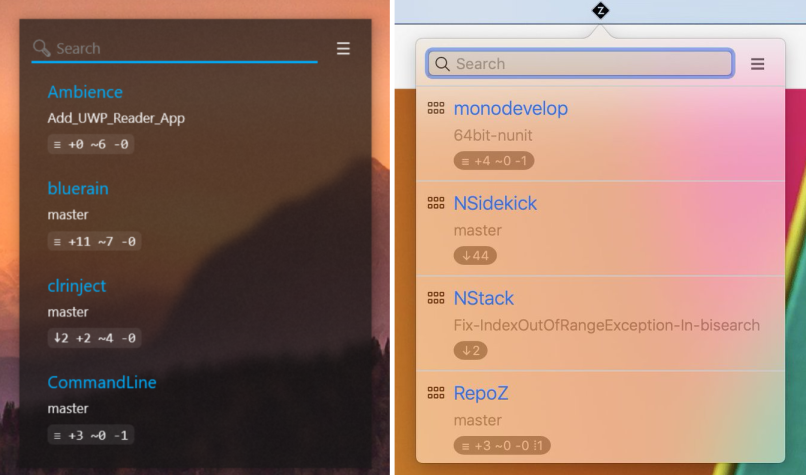Changelog History
Page 2
-
v3.1.1 Changes
July 02, 2018🚀 This service release lowers RepoZ' CPU impact on Windows (see issue #46).
-
v3.1 Changes
May 25, 2018Final(ly) on Mac
🍎 25 days have passed since RepoZ had it's comeback to macOS as preview build. Now, I am proud to announce that RepoZ made it to a stable build for both: Windows and macOS.
⚡️ The Windows version was updated to match the popup-like nature of the Mac app, so there's no close button anymore. Instead it got a search box as the Mac app did from the beginning. As a popup, the window will hide itself once it loses focus so there's no need to minimize or close the window anymore.
⚡️ In addition, both versions can now be used with the keyboard. And they can check for updates automatically (however they will just give you a hint, so you stay in control).
💅 Both apps were slightly polished and show an "empty hint" as long as there are no repositories to track. This comes with the biggest change for Windows users: RepoZ won't scan the hard drives automatically on startup anymore. That caused much IO load on machines with lots of and/or big HDDs. Instead, the persistent repository cache was improved and the trigger to scan for repositories has to be given by the user manually. I expect you to not trigger that very often since new repositories are detected on git-clone or while switching or checking out branches automatically.
💻 One last thing: As a result of the keyboard-optimization, there are hotkeys now to open the RepoZ UI.
🏁 For Windows, use Ctrl+Alt+R. On Mac it's Command+Alt+R. However on Mac you need to give RepoZ access to the keyboard events in the system privacy settings. Once you have done this, you might need to restart the app. -
v3.0
April 30, 2018 -
v3.0-alpha
April 30, 2018 -
v2.2 Changes
December 21, 2017Elevate grr!
🚀 This release is a fairly small improvement compared to the additions from Version 2.1, so please don't miss the prior Release Notes.
Version 2.2 adds the possibility to invoke the Windows UAC to request elevated privileges for processes to start. So if you need your Visual Studio solution to be started "as Administrator" (because you host a WCF web service, for example), you can now open it with grr as well. Just call:
grr open MyRepository *.sln -e(or... --elevated).
Note that this will open all solution files in the main directory of the Git repository.In addition, grr got its well deserved app icon now. However, because grr is a pure console application, most users won't see it in action. Anyway, thanks to Freepik and www.flaticon.com for giving that one away for free.
Don't miss to check
grr help,
Happy grr ing! -
v2.1 Changes
December 20, 2017Boost your CLI with grr!
This release focuses on grr. Now, you can open the operating system's default file browser in the main directory of a Git repository from anywhere in your CLI by using the new command
open:
grr open RepoZor as always with RegEx:grr open Re.*.
🔔 Notice the difference togrr cd RepoZwhich makes the CLI itself change its working directory.👍 File support
grr can now work with files of a repository if a file pattern is added. This works with
listandopen.
0️⃣ For files,openwill use the operating system's default applications.The following statement opens Visual Studio solutions located in the repository's main directory:
grr open RepoZ *.sln
🏁 With this, you don't have to use the Visual Studio start page anymore or hunt through Windows Explorer windows to find the solution files. We all know that these Explorer windows will stay open and will make you freak out later the day.To list (or open) files in subfolders of the Git repository, the option
--recursive(or short-r) can be added:
grr list RepoZ *.txt --recursiveDon't miss to check
grr help,
Happy CLI ing!
